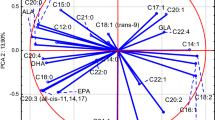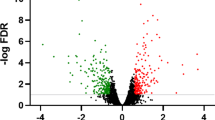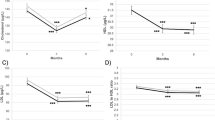Abstract
STUDIES have been made of lambs taken from their dams at 4 weeks of age and weaned, by stages, on to a selenium-deficient diet of the type used by Schwarz1 for the development of dietary hepatic necrosis in rats. Lambs on this diet develop muscular dystrophy, the lesions appearing in both the cardiac and skeletal musculature; the livers do not become necrotic as they do in the rat. Control lambs fed the same diet, supplemented with an oral drench of 10 mg of sodium selenite per week, do not develop muscular dystrophy.
This is a preview of subscription content, access via your institution
Access options
Subscribe to this journal
Receive 51 print issues and online access
$199.00 per year
only $3.90 per issue
Buy this article
- Purchase on SpringerLink
- Instant access to full article PDF
Prices may be subject to local taxes which are calculated during checkout
Similar content being viewed by others
References
Schwarz, K., Proc. Soc. Exp. Biol. and Med., 77, 818 (1951).
Muth, O. H., Oldfield, J. E., Remmert, L. F., and Schubert, J. R., Science, 128, 1090 (1958).
Godwin, K. O., Quart. J. Exp. Physiol., 50, 282 (1965).
Author information
Authors and Affiliations
Rights and permissions
About this article
Cite this article
GODWIN, K. Electrocardiograms of Lambs in Selenium Deficiency. Nature 209, 1030–1031 (1966). https://doi.org/10.1038/2091030b0
Issue date:
DOI: https://doi.org/10.1038/2091030b0



